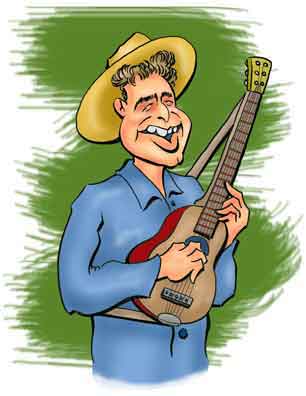Johnny Horton

On November 7, 1960, the front page of the Taylor [Texas] Daily Press helped its citizens catch up with the latest news. It was a Monday, and the next day was the presidential election between the Democratic Party candidate John Fitzgerald Kennedy and Republican Richard Milhous Nixon.
The leading headline blared that a record-breaking 67 million people were expected to cast their votes. Seven large states held the key to the election: New York, Pennsylvania, Ohio, Illinois, Michigan, California, and Texas. These counted for 205 of the 269 electoral votes needed for elections. That was 37% of the total population. In an accompanying story, pollster George Gallup gave Jack a slight edge over Dick1.
Footnote
The prediction proved correct. Jack won but with one of the slimmest popular votes (not counting elections where the winner had fewer popular votes but won in the Electoral College). Jack beat Dick by little more than 100,000 votes.
To the side was a three-column photograph showing the US Senator from Texas and vice presidential candidate, Lyndon Baines Johnson. Together with his wife, known to all as Lady Bird, Lyndon was greeted by - and we quote - "a jeering crowd of Republican anti-Johnson demonstrators who lined the streets near the downtown Dallas hotel where Johnson was scheduled to speak at a luncheon." Neither Lyndon nor Lady Bird looked particularly happy. There was also a short article on how someone had defaced GOP campaign posters. The writer stated that people had become disenchanted with politics.
Directly under the picture was a headline that blared: "Kennedy Hits Nixon's 'Peace by Parades Idea'". The Democratic presidential candidate (and senator from Massachusetts) John Fitzgerald Kennedy was miffed as he thought his Republican opponent, Richard Milhous Nixon (the current vice president) believed peace with the Soviet Union could come by visiting Moscow and watching the parades sponsored by the Communist dictators. Huh! That's a weird idea. Achieving peace by actually talking to the Soviet leaders!
Jack also thought Dick was spending too much money on his political ads. Jack's press secretary, Pierre Salinger, claimed that Dick had shucked out of a whopping $600,000 in one day for his television spots. Pierre snorted that the voters deserved to know where the money was coming from and what Dick had promised to get the dough.
But not all was politics. We read that Clark Gable was resting after a heart attack, the first teacher's strike in New York's history had been called, and funeral services were being held for Ward Bond. Ward was the star of the popular Western television show Wagon Train and had died two days before during a trip to Dallas.
All on Page 1.
Turning the page you found typical stories of the day. The NFL was in a tight race with Philadelphia doing well (certainly compared to later years), the AFL's Houston Oilers had shutout the San Francisco (ergo, Oakland) Raiders, and the Hutchinson Kansas Daily News had protested that women reporters had been forbidden to enter the pressbox during the University of Kansas football game.
Delving further into the depths of the paper, there was news from the high schools, ads about bargains at the local grocery stores, and the inevitable page of opinion pieces. The latter included a surprisingly balanced (by today's standards) editorial cartoon urging the readers that regardless of their choice, they should get out and vote. And there was farm and business news and of course, the comics page. Among the panels printed for the readers' pleasure was the still extant Alley Oop and Nancy, as well as the popular but now-defunct Li'l Abner.
And on the last page - the page after the comics - was the brief paragraph:
Recording star Johnny Horton, 35, was killed Saturday in a two-car collision on a railroad overpass at Milano in Central Texas. Horton was a resident of Shreveport, La.
So why was the tragic death of the #1 country singer relegated such obscurity, an international star whose hit records had crossed to the tops of the pop charts, a Grammy Award and Gold Record winner who had appeared on the nation's most popular television program, and who sang the title song for what became one of the hit movies of the year and which featured one of the biggest stars of the 20th century?
We cannot hold the truth to be neither self-evident nor is the answer, my friends, blowin' in the wind. Instead the explanation requires understanding of the changes that have occurred within the social diversity and hierarchies within American culture.
But before we continue, let's pause to refresh ourselves with Johnny's even now iconic hit as heard around much of the world:
In eighteen-fourteen we took a little trip
Along with Colonel Packingham up the Mississipp.
We took a little bacon and we took a little beans
And we met the bloomin' rebels in a town in New Orleans.
Hm. Not quite as we remembered. So perhaps we might seek disentanglements of the lyrical discrepancies while learning a little about Johnny Horton. Or perhaps we can if we just click here.